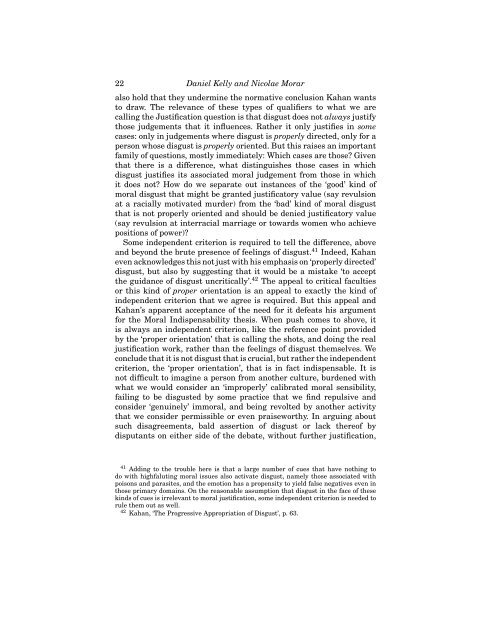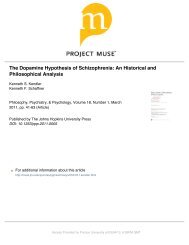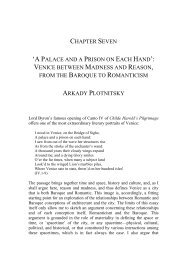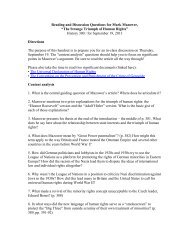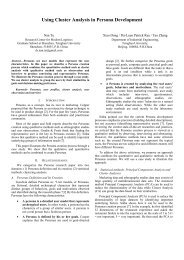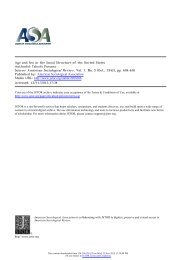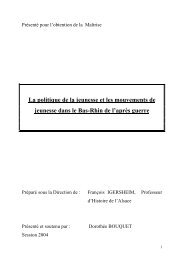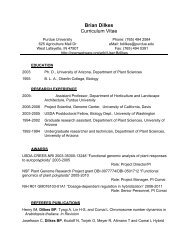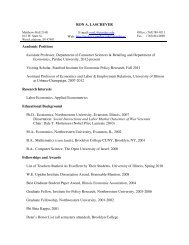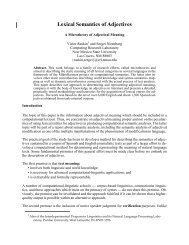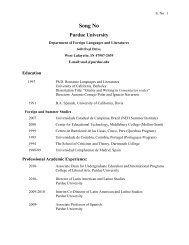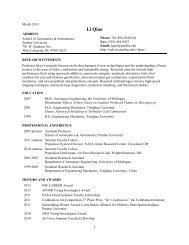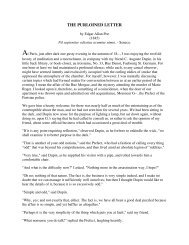Against the Yuck Factor - Career Account Web Pages - Purdue ...
Against the Yuck Factor - Career Account Web Pages - Purdue ...
Against the Yuck Factor - Career Account Web Pages - Purdue ...
Create successful ePaper yourself
Turn your PDF publications into a flip-book with our unique Google optimized e-Paper software.
22 Daniel Kelly and Nicolae Morar<br />
also hold that <strong>the</strong>y undermine <strong>the</strong> normative conclusion Kahan wants<br />
to draw. The relevance of <strong>the</strong>se types of qualifiers to what we are<br />
calling <strong>the</strong> Justification question is that disgust does not always justify<br />
those judgements that it influences. Ra<strong>the</strong>r it only justifies in some<br />
cases: only in judgements where disgust is properly directed, only for a<br />
person whose disgust is properly oriented. But this raises an important<br />
family of questions, mostly immediately: Which cases are those? Given<br />
that <strong>the</strong>re is a difference, what distinguishes those cases in which<br />
disgust justifies its associated moral judgement from those in which<br />
it does not? How do we separate out instances of <strong>the</strong> ‘good’ kind of<br />
moral disgust that might be granted justificatory value (say revulsion<br />
at a racially motivated murder) from <strong>the</strong> ‘bad’ kind of moral disgust<br />
that is not properly oriented and should be denied justificatory value<br />
(say revulsion at interracial marriage or towards women who achieve<br />
positions of power)?<br />
Some independent criterion is required to tell <strong>the</strong> difference, above<br />
and beyond <strong>the</strong> brute presence of feelings of disgust. 41 Indeed, Kahan<br />
even acknowledges this not just with his emphasis on ‘properly directed’<br />
disgust, but also by suggesting that it would be a mistake ‘to accept<br />
<strong>the</strong> guidance of disgust uncritically’. 42 The appeal to critical faculties<br />
or this kind of proper orientation is an appeal to exactly <strong>the</strong> kind of<br />
independent criterion that we agree is required. But this appeal and<br />
Kahan’s apparent acceptance of <strong>the</strong> need for it defeats his argument<br />
for <strong>the</strong> Moral Indispensability <strong>the</strong>sis. When push comes to shove, it<br />
is always an independent criterion, like <strong>the</strong> reference point provided<br />
by <strong>the</strong> ‘proper orientation’ that is calling <strong>the</strong> shots, and doing <strong>the</strong> real<br />
justification work, ra<strong>the</strong>r than <strong>the</strong> feelings of disgust <strong>the</strong>mselves. We<br />
conclude that it is not disgust that is crucial, but ra<strong>the</strong>r <strong>the</strong> independent<br />
criterion, <strong>the</strong> ‘proper orientation’, that is in fact indispensable. It is<br />
not difficult to imagine a person from ano<strong>the</strong>r culture, burdened with<br />
what we would consider an ‘improperly’ calibrated moral sensibility,<br />
failing to be disgusted by some practice that we find repulsive and<br />
consider ‘genuinely’ immoral, and being revolted by ano<strong>the</strong>r activity<br />
that we consider permissible or even praiseworthy. In arguing about<br />
such disagreements, bald assertion of disgust or lack <strong>the</strong>reof by<br />
disputants on ei<strong>the</strong>r side of <strong>the</strong> debate, without fur<strong>the</strong>r justification,<br />
41 Adding to <strong>the</strong> trouble here is that a large number of cues that have nothing to<br />
do with highfaluting moral issues also activate disgust, namely those associated with<br />
poisons and parasites, and <strong>the</strong> emotion has a propensity to yield false negatives even in<br />
those primary domains. On <strong>the</strong> reasonable assumption that disgust in <strong>the</strong> face of <strong>the</strong>se<br />
kinds of cues is irrelevant to moral justification, some independent criterion is needed to<br />
rule <strong>the</strong>m out as well.<br />
42 Kahan, ‘The Progressive Appropriation of Disgust’, p. 63.


